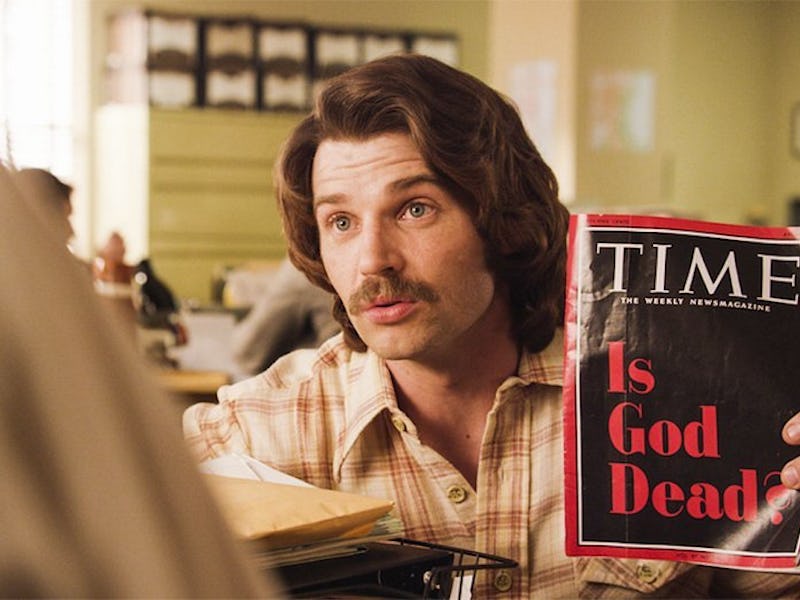Verdict on 'The Case For Christ': It Didn't Make Me a Christian
But it's not a bad movie.

Whether by design or sheer coincidence, the 1 p.m. screening of The Case for Christ that I attended this past Sunday was perfectly timed to sync with the end of morning mass. Fandango-savvy worshippers recognized this, and several church groups surrounded my friend and me in the theater as we ate contraband snacks from CVS bags and felt tinges of unexpected guilt.
Based on Lee Strobel’s famed text about his journey from a young skeptic reporter to a respected Christian leader, the film was produced by religious production company Pure Flix but was marketed as more of a period newsroom-detective story than a spiritual journey. And yet, we all know what is going to happen: We’ll see a 1980s version of Mike Vogel spout the line “You’re leaving me for JESUS!” at least three times, then watch him pray in the closing scene.
I’ve brought my friend Alex with me to add some perspective. He was raised in a Jewish household but his mother’s side of the family was Christian. I was baptized Catholic, raised Protestant and dabbled in Wiccanism as an accessory to my mom’s mid-life crisis before giving up on the whole religion thing sometime in early middle school. Like many kids in our generation, we were raised with some basic idea of religion, but our parents never strictly enforced it. We’re closer to the Lee of the beginning of the movie except without the mustache and the hot wife and a level of skepticism for God that is at one point called out as being vaguely Freudian.
Let’s not dig deeper on that last point, OK?
Mike Vogel with real-life subject Lee Strobel and his wife Leslie on the set of "The Case for Christ."
The Case for Christ, to its credit, is not half as ham-fisted as I imagined it would be. Here’s what happens: Lee Strobel gets pissed that his wife (played admirably by Erika Christensen) starts to believe in God and attend church, so he decides to write a story for The Chicago Tribune to prove that the story of Jesus couldn’t possibly have happened. He gets drunk and almost ruins his marriage, and then believes in God forever. (To be clear, I imagined it would be pretty ham-fisted.)
As Alex points out several times in the form of falling asleep on me with his massive head, the two-hour runtime is not necessary to get his point across. For someone who is a skeptic bordering on a vague believer, though, I can see how the story could be effective. In Lee Strobel and his wife, Leslie, we see two intelligent, capable characters who love each other with opposite views on the same issue.
Leslie, of course, is in the right, according to the film’s producers. Her husband, after too many era-appropriate Schlitzes, will sometimes be condescending to her for her desire to find her faith. But the movie doesn’t punish the film’s atheists, either. Miraculously (but, you know, not that kind of miraculously) one of Lee’s good friends remains an atheist at the end of the film without a negative judgement being passed. “I came to my conclusion, and you’ve got to come to yours,” his intellectual, Bertrand Russell-quoting friend tells Lee, who grows comically sweatier as he inches closer to God.
When Lee gets there, he and his wife share a tasteful kiss before Lee embarks on writing the manifesto from which the film gets its name, The Case for Christ. Overall, the message of the movie seemed to encourage exploring faith and reaching your own conclusions while hinting that those who ended up in the Christianity camp juuuuuuust might be a little better off.
“It’s not your average Christian channel bullshit,” Alex remarked. “Like, at least it looks like a real movie.”
And it’s true.
"The Case for Christ" leans into the journalism angle.
As the church groups filed out, Alex and I could agree on one thing — it really wasn’t what The Case for Christ says about religion that feels preachy, but rather what it leaves out.
We don’t have room for all of it here, but feel free to give Spotlight a watch if you’re looking for a movie that is framed through journalism but doesn’t give any benefit of the doubt to religious leaders. The Case for Christ is technically tackling the story of Christ alone, not the massive infrastructure that has been built around it; Strobel’s book and original piece for The Chicago Tribune were strictly limited to whether the story of Jesus, specifically the crucifixion, was more fact or fiction. While his argument and research indicates that this did happen has bearing on whether he buys into the idea of the Christian belief system, but not on the problematic ways it’s structured.
So does this movie really make a case for Christ? In a scattered, montage-y way, it has its moments, catching the audience up in its All the President’s Men kind of journalistic fervor and encoding the moments of religion in a far less ham-fisted way than we’ve come to expect from Christian entertainment. Depending on how it does at the box office, it’ll be interesting to see where Pure Flix goes with this new subtlety — one that, quite honestly, has been relatively absent from most of their output to date.
“I’m still a Jew, but I didn’t hate it,” Alex remarked as we downed the last of the Sour Patch Kids we had illegally snuck in. And honestly, for a widely released Christian movie, that feels like a pretty big accomplishment.